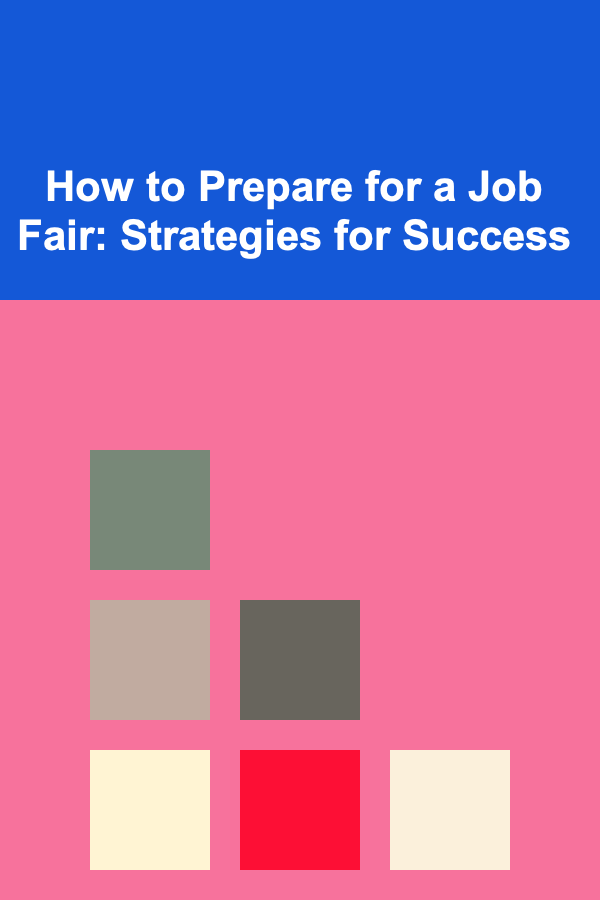
How to Prepare for a Job Fair: Strategies for Success
ebook include PDF & Audio bundle (Micro Guide)
$12.99$9.99
Limited Time Offer! Order within the next:

Job fairs are excellent opportunities for job seekers to connect with potential employers, learn about various companies, and find exciting job openings. However, attending a job fair without proper preparation can result in missed opportunities. To maximize your chances of success, it's essential to have a well-thought-out strategy before attending. This guide provides actionable steps to help you prepare for a job fair and make the most of your experience.
Research the Companies Attending
The first step in preparing for a job fair is to research the companies that will be present. Most job fairs will have a list of participating organizations available in advance, either on their website or through promotional materials.
Why This Matters:
Researching companies beforehand allows you to:
- Tailor your approach: By understanding the companies' missions, values, and job openings, you can customize your resume, elevator pitch, and questions to be relevant to each company.
- Focus your energy: Job fairs can be overwhelming with so many companies in attendance. Knowing which companies align with your career interests and goals allows you to prioritize them.
- Stand out: Employers appreciate candidates who have taken the time to learn about their company. This shows initiative, interest, and a serious commitment to the opportunity.
Actionable Steps:
- Visit the websites of the companies attending the job fair.
- Identify the roles they're hiring for and assess whether they match your skills and interests.
- Look up recent news about the companies to understand their current challenges, successes, and overall direction.
- Prepare a list of questions to ask recruiters, showing that you've done your research.
Tailor Your Resume and Application Materials
Before attending the job fair, it's crucial to have an updated resume that highlights your relevant skills, experiences, and accomplishments. You want your resume to reflect the positions you're seeking and be tailored to each company you're interested in.
Why This Matters:
- A strong resume: A well-crafted resume helps you make a great first impression with recruiters. It's your marketing tool and can directly influence the outcome of your interactions.
- Targeted resumes: By customizing your resume for each company, you increase your chances of being noticed for specific job openings.
Actionable Steps:
- Update your resume: Make sure it's current, and clearly highlights your most recent work experience, skills, and achievements.
- Tailor your resume for different industries: Depending on the companies you're targeting, you may need to adapt your resume to emphasize skills and experiences that are most relevant to that industry.
- Create multiple versions: Have different versions of your resume ready for different roles or industries. For example, one for marketing positions and another for customer service roles.
- Prepare other documents: In addition to your resume, consider bringing business cards, a portfolio (if relevant), or a list of references to share with recruiters.
Perfect Your Elevator Pitch
An elevator pitch is a brief, persuasive speech that you can use to spark interest in who you are, what you do, and what you're looking for. It should be short enough to be delivered in about 30 seconds to one minute.
Why This Matters:
- First impressions count: An elevator pitch is often the first thing a recruiter will hear from you. If it's concise, impactful, and tailored to the role you're interested in, it can grab their attention and prompt further discussion.
- Confidence and professionalism: A well-prepared elevator pitch demonstrates that you're clear on your career goals and confident in your abilities.
Actionable Steps:
- Introduce yourself: Start with your name, your current role (or academic background if you're a student), and a brief overview of your professional experience.
- Highlight your skills: Focus on the key skills and experiences that make you a strong candidate for the positions you're targeting.
- Tailor it: Customize your pitch for each company you approach at the fair, focusing on the specific roles and skills they are seeking.
- Practice: Rehearse your pitch until it feels natural and conversational, not robotic.
Dress Professionally
The way you present yourself at a job fair speaks volumes about your professionalism and how seriously you take the opportunity. Dress appropriately for the type of jobs you're applying for and the industry standards.
Why This Matters:
- Professionalism: First impressions matter, and your appearance can set the tone for how recruiters perceive you.
- Confidence: Dressing professionally boosts your confidence and helps you feel more prepared for the event.
- Respect for recruiters: By dressing appropriately, you show that you respect the recruiters' time and the importance of the job fair.
Actionable Steps:
- Research the industry dress code: For example, if you're attending a fair for tech companies, business casual may suffice, but for corporate finance or law firms, formal business attire is more appropriate.
- Pay attention to details: Ensure your clothes are clean, well-fitted, and wrinkle-free. Pay attention to grooming and avoid excessive jewelry or accessories that may be distracting.
- Comfort matters: Remember, you might be standing and walking for long periods, so wear comfortable shoes while maintaining a professional appearance.
Prepare to Network
Networking is one of the most valuable aspects of attending a job fair. It's not just about applying for jobs---it's about creating connections that can lead to future opportunities. Be ready to engage in conversations with recruiters, other job seekers, and even industry professionals who may be attending.
Why This Matters:
- Building relationships: Networking allows you to create lasting connections with people who can provide valuable insights or refer you to job opportunities.
- Learning about industry trends: Job fairs are great places to gather insights about your industry or the job market in general, which can help you make more informed decisions.
Actionable Steps:
- Ask questions: Show genuine interest in the companies you're targeting. Ask recruiters about their hiring process, company culture, and any upcoming opportunities.
- Make a strong first impression: When networking, focus on being approachable, friendly, and professional. Be ready to talk about your skills, experiences, and what you're looking for in a job.
- Follow up: After meeting with recruiters, exchange business cards or LinkedIn profiles and follow up with a thank-you email. Express your gratitude for their time and reiterate your interest in the company.
Practice Your Interview Skills
Some job fairs offer on-the-spot interviews with recruiters or representatives from companies. Being prepared for this possibility can set you apart from other job seekers.
Why This Matters:
- Seize opportunities: If you're able to secure an interview during the job fair, it's a direct path to a potential job offer.
- Boost your confidence: Practicing your interview skills beforehand will help you feel more at ease and present yourself confidently to recruiters.
Actionable Steps:
- Prepare common interview questions: Research common interview questions for the positions you're interested in. Practice your responses out loud so you can answer smoothly.
- Be concise: While answering interview questions, be concise and focus on your key skills and experiences. Avoid long-winded responses.
- Demonstrate enthusiasm: Show passion for the role and company, and express your excitement about the possibility of joining the team.
Follow Up After the Job Fair
After the job fair, it's essential to follow up with the recruiters or companies you spoke with. A well-written follow-up email can help you stand out and reinforce your interest in the positions you discussed.
Why This Matters:
- Shows professionalism: Following up demonstrates that you are proactive, organized, and serious about pursuing the opportunity.
- Keeps you top of mind: After a busy job fair, recruiters may meet dozens of candidates. A follow-up email can help remind them of who you are and your qualifications.
Actionable Steps:
- Send a thank-you email: Within 24-48 hours of the job fair, send a personalized thank-you email to each recruiter you met. Express appreciation for their time and reiterate your interest in their company.
- Mention specifics: Reference specific topics from your conversation, such as a particular job opening you discussed or something notable about the company.
- Stay professional: Keep the tone of your email professional and respectful, and include your updated resume for their reference.
Conclusion
Preparing for a job fair takes effort, but the rewards can be significant. By researching companies, perfecting your resume and elevator pitch, dressing professionally, networking, and following up afterward, you'll increase your chances of making a lasting impression on recruiters. A job fair is a powerful tool in your job search arsenal---so approach it with confidence and strategy, and you'll be well on your way to securing your next career opportunity.
Reading More From Our Other Websites
- [Home Security 101] How to Lock Your Home Properly for Maximum Security
- [Home Party Planning 101] How to Host a Casual Get-together with Minimal Stress: Your Guide to Effortless Home Entertaining
- [Organization Tip 101] How to Teach Kids About Car Organization from an Early Age
- [Home Storage Solution 101] How to Organize Your Garage with Creative Shelving Ideas
- [Home Cleaning 101] How to Clean Your Home Efficiently on a Budget
- [Rock Climbing Tip 101] Gear Guide: Choosing the Perfect Shoes, Harnesses, and Ropes for Sport Climbing
- [Home Space Saving 101] How to Use Furniture Layout to Create Flow in Small Homes
- [Home Pet Care 101] How to Deal with Separation Anxiety in Pets While You're at Home
- [Personal Care Tips 101] How to Combine Hair Mousse with Other Styling Products
- [Organization Tip 101] Why You Should Consider a Mobile Storage Solution

How to Choose Between a Full Renovation and a Remodel
Read More
How to Maximize Small Closet Space for Better Organization
Read More
How to Use Art and Décor to Add Personality Without Overwhelming Buyers
Read More
How To Find Long-Term Stays and House-Sits
Read More
How to Create a Personalized Snowboard Instructor Lesson Plan
Read More
10 Tips for Automating Customer Support Engineering Tasks
Read MoreOther Products

How to Choose Between a Full Renovation and a Remodel
Read More
How to Maximize Small Closet Space for Better Organization
Read More
How to Use Art and Décor to Add Personality Without Overwhelming Buyers
Read More
How To Find Long-Term Stays and House-Sits
Read More
How to Create a Personalized Snowboard Instructor Lesson Plan
Read More